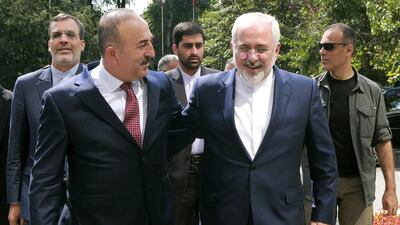In the past week, contacts between Turkish, Russian and Iranian officials have led to speculation that the countries are seeking an arrangement to end the Syrian conflict. Notably absent from the discussions has been the United States.
Following last week’s summit between Turkish president Recep Tayyip Erdogan and Russian president Vladimir Putin, Iranian foreign minister Mohammad Javad Zarif visited Ankara, where he met his Turkish counterpart Mevlut Cavusoglu. Both men affirmed that their countries would collaborate over maintaining Syria’s “territorial integrity”, meaning they would oppose any Kurdish entity there.
On Monday, Turkish prime minister Binali Yildirim expressed optimism that the regional states could find a political solution in Syria. He proposed a three-point road map that could lead in that direction: the defence of Syria’s territorial unity, including the prevention of Kurdish plans to impose a federal structure; a reconstitution of the Syrian state, but not on sectarian, ethnic or geographical foundations; and a return of refugees in the context of a clear-cut plan.
Despite the hopefulness, the path towards a settlement in Syria remains extremely complicated. For one thing, there is still no agreement on the future of president Bashar Al Assad. Mr Yildirim’s comments on rebuilding Syria on foundations other than sect were specifically aimed at creating conditions for Mr Al Assad’s ultimate departure from power. But Russia and Iran have kept their intentions much vaguer.
Nor has regional harmony been visible in Aleppo. Turkey reportedly armed the rebels heavily before their recent counter-attack in the city. This allowed them to break the siege of its eastern neighbourhoods and encircle regime areas.
Meanwhile, Washington supports the very forces that Turkey and Iran oppose. The recent victory against ISIL in Manbij by the US-backed Syrian Democratic Forces, a Kurdish-Arab coalition dominated by the Kurds, rang alarm bells in Ankara and Tehran. They fear the Kurds, under the guise of fighting ISIL, will seek to unify Kurdish areas in northern Syria.
In an interview on Monday with Al Hayat, Salih Muslim, the head of the Kurdish Democratic Union Party, openly admitted that the Kurdish priority today was to move in the direction of Afrin, the western area of Kurdish control in northern Syria, not Raqqa, which the Americans prefer. Kurdish success would represent a red line for Turkey, but also Iran, as both countries fight Kurdish separatism at home.
Now that Manbij has fallen the Turks have asked the United States to oblige the Kurds to withdraw east of the Euphrates. How the Americans will manage the conflicting interests of the different forces in Syria, while also keeping up the pressure on ISIL, is unclear. But president Barack Obama will soon be leaving office, so resolving that problem may be someone else’s task.
However, one thing this new reality has already shown is that the ISIL-focused strategy of the Obama administration has allowed other states to circumvent it in any diplomatic moves over Syria. It’s remarkable that the secretary of state, John Kerry, is still officially pursuing the Geneva process, at a time when regional contacts may be moving beyond it.
Last weekend, Iran’s deputy foreign minister said that Iran and Turkey had agreed to a general framework for a resolution in Syria. It included preserving the country’s sovereignty and territorial integrity and establishing an expanded Syrian government to allow Syrians themselves to decide on the future of their country. No mention was publicly made of Mr Al Assad’s fate, a cornerstone of Geneva.
That the United States is not a direct party to the talks suggests its ability to shape the outcome in Syria is limited. Washington’s relations with Turkey, Iran and Russia have been turbulent lately, and Mr Kerry has struggled to defend American priorities. For an Obama administration that claims to be “realist” politically, the fact is that, for now, the United States appears not to be at the table.
With a coalition forming to oppose Kurdish gains in Syria, the Americans may soon find that their stakes in the country will be challenged directly. This comes at a time when the Russians have indicated they intend to turn Syria’s Hmeimim airbase into a full-fledged Russian military facility and expand its infrastructure. Mr Putin may see an opening to push the United States out of the eastern Mediterranean.
That may not bother Washington, which would probably regard Russia as a counterweight to Iran in an area where the Obama administration believes it has few strategic interests beyond Israel. But American minimalism may not please Mr Obama’s successor, who will have trouble clawing back the influence America once enjoyed.
Many regional countries have begun to regard Russia as essential to the outcome of regional crises, where for decades that role had been reserved for the United States. That may be what Mr Obama wants, but no country should ever take pleasure in its own marginalisation.
Michael Young is a writer and editor in Beirut
On Twitter: @BeirutCalling


